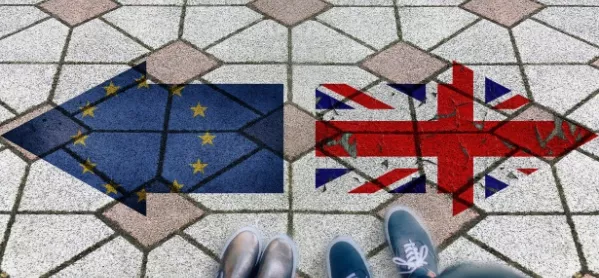- Home
- ‘Political chaos grips us, but teachers can look on the bright side’
‘Political chaos grips us, but teachers can look on the bright side’

Cabinet ministers have resigned and more could follow, the prime minister is fighting for her political life and a third general election in four years looks increasingly likely.
Meanwhile, a second referendum on the most contentious issue in post-war British political history may be just around the corner. We are a country split asunder and chances of a consensual, unified way forward look more remote than ever.
We are, it is safe to say, in a very big mess. Yet, for teachers and schools, there could be a very valuable upside to the tragedy that currently befalls us - they are likely to be left alone to get on with their jobs.
We know this because it is already happening. The egregious wounds that two successive PMs have inflicted on themselves have effectively seen off two policy programmes that would have meant huge upheaval in the schools sector: the shift to an all-academy system and a new wave of grammar schools.
Now, as a member of a government lacking a majority, political capital or much in the way of new funds, our current education secretary could not do anything new and radical even he wanted to do.
Damian Hinds has been left with no option but to sort out two festering, long-neglected, problems: teacher workload and the recruitment crisis that it has helped to foster. True, there may be little evidence of significant progress yet - and some argue that sorting out teacher shortages is beyond the government’s reach anyway. But our ministers are at least concentrating on the most pressing matters in education rather than cooking up new wheezes and eye-catching initiatives.
School inspectors shunned
England’s schools sector is far from the only thing to benefit from the political paralysis. American stock markets celebrated earlier this month after the midterm elections delivered the House of Representatives to the Democrats and divided the federal government, with the Dow Jones index soaring by 545 points. Why? Because as far as investors are concerned, “gridlock is good”, as the “inability of lawmakers and the president to accomplish much means politicians won’t be able to do much harm”.
Until recently, Belgium was the proud holder of the record for the longest period of time without an elected government - 589 days - after parties representing the Flemish and Walloons were unable to form a governing coalition. That meant a lengthy spell in 2010-11 with no big decisions on the budget, national debt, foreign policy or defence.
But fears that the stalemate would trigger a debt crisis engulfing all of Europe failed to materialise. And, as one report put it, the experience demonstrated that the “absence of a government” made “little difference to day-to-day life in Belgium”.
In August, Belgium lost its record to Northern Ireland - another country split between two often feuding communities unable to form a government. And although such political uncertainty may be unwelcome in the long term, there have already been undoubted benefits for teachers.
January 2017 saw the profession begin slow-burn industrial action over workload in the province, just as the Northern Ireland government collapsed. This has involved non-cooperation with school inspectors and a collective refusal to carry out pointless tasks, leaving “happy” teachers able to focus on teaching. And, because of an absence of political leadership to broker a deal, it has stayed that way.
I am not arguing that government is an intrinsically bad thing that should always be kept to a minimum - far from it. Without government we would not have any state schools at all. And gridlock is not always good - it would surely be beneficial, for example, if there was enough movement in the US system to curb Trump’s worst excesses.
But, and it is a big but, politicians’ ideas are often not good ones, and their motivations are not always the best. Sometimes they act, not because there is an urgent problem that needs solving, but because they have an urgent need to be seen to be doing something, anything, so long as it looks big and important.
Disruption for its own sake is rarely beneficial and often downright counterproductive. Schools in this country have long been more vulnerable than most policy areas to pointless, time-consuming, energy-sapping political meddling. Education is seen as a cure for all ills and, as everyone went to school, everyone regards themselves as an expert.
Sensible big new ideas in schools policy have become increasingly scarce - witness the two aforementioned Downing Street-inspired schemes that bit the dust. So now, as political crisis engulfs our country, be thankful for one thing: our politicians are too busy messing up Brexit to create any more chaos in our schools.
Keep reading for just £1 per month
You've reached your limit of free articles this month. Subscribe for £1 per month for three months and get:
- Unlimited access to all Tes magazine content
- Exclusive subscriber-only stories
- Award-winning email newsletters



